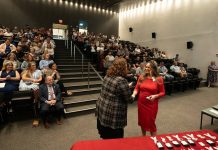The feelings of anger, rage and helplessness kept welling up with every story of sexual assault that spilled from the news.
Alisha Lewis watched during the past year as one young woman after another stepped forward to describe the abuse they suffered at the hands of Larry Nassar, a former team doctor for USA Gymnastics accused of molesting more than 250 girls.
She felt the pain of their experiences. When she was 15, she was sexually abused by her pastor, a man she trusted and who took advantage of that.
Lewis silently cheered at the harsh sentence that Nassar received — for his crimes, he’ll spend the rest of his life in prison. But she also wondered, if not for the massive media coverage, the sheer number of victims, the fact that a number of his victims were famous gymnasts the public already knew, would that have happened?
[sc:text-divider text-divider-title=”Story continues below gallery” ]
“That’s one of those things where you wonder why no one did anything. How many victims could have been spared if one person would have done the right thing?” she said.
Lewis, now 24, is married with two young children. The process of healing from her abuse and restoring her sense of self-worth took years.
Taking her own experience, and the increased spotlight that the Nassar case and the #MeToo movement have placed on sexual abuse, Lewis is using her story to hopefully impart change. She is working with local legislators to close loopholes in the sentencing structure for sexual crimes, and helping educate others about sexual abuse.
Her goal is now to raise awareness of the pervasiveness of sexual violence and ensure people convicted of these crimes serve sentences more equal to the pain they’ve caused.
“This isn’t about getting back at my abuser. This is just an overwhelming problem,” she said. “You hear about it in the news every day, and people say, ‘That’s horrible.’ But what’s being done to stop it?”
How it began
Lewis’ family attended New Whiteland Baptist Church, where she met Daniel Moore, who was pastor of the church at the time. Her parents had asked Moore to meet with her, as she was acting out and getting in trouble at home, according to the court’s probable-cause affidavit.
But their relationship turned sexual. Lewis and Moore began arranging meetings days in advance and using code names to keep the relationship secret, according to the probable-cause affidavit. Moore gave her a data card for her cell phone, so that she could send him text messages and call him without the records showing up on her family’s cell phone bill.
Over the span of three months in 2009, they kissed or engaged in sex acts on at least seven occasions, Lewis told police.
“I’m accepting of who I am. I feel like I’m strong enough to say that despite the fact that I’ve been through this, despite the fact that I have this pain in my past, I can do something proactive to help in the future.”
— Alisha Lewis, sexual abuse victim
Moore was arrested in April 2009, and pleaded guilty the following year to two felonies — child solicitation and sexual misconduct with a minor. He could not be reached for comment.
Lewis’ memories from that time, including the arrest and trial, are spotty. Her parents tried to shield her as much as they could from the legal process as it slowly inched forward.
“At 15, I was very guarded from everything that was going on. I knew the bare minimum, which I’m glad for. I don’t think I could have handled knowing it all,” she said.
Moore accepted a plea deal to serve 10 years in prison. But through Indiana law, credit for good behavior and earning an associates degree, he was released in May 2012.
Lewis and her family was horrified to learn that her abuser was done with his prison sentence while she still bore the scars of her sexual trauma. She said that only in the past two years has she fully healed from her abuse.
“He was out on the street and free with little restraint before I was even able to trust anyone again,” she said.
That anger and disgust seethed inside Lewis for years. In January, as the Nassar trial was unfolding and more and more powerful men were being revealed to be sexual predators, she vowed to take action.
In a blog post she wrote, she described her own experience, and how the justice system continues to treat victims unfairly compared to their abusers. She called out to other survivors of abuse to share their story, pledging her support. She challenged prosecutors and lawmakers to do more to fix the system.
She started researching existing Indiana law, as well as the laws of surrounding states, to get a sense of how these types of offenses are punished. In Indiana, these crimes are considered lower-level felonies.
Sentences for sex crimes range from three to 16 years for rape, to six months to six years for child seduction. The advisory sentence for rape is nine years, and three years for child seduction if sexual intercourse took place.
“I didn’t realize the laws aren’t as strong as you’d think they are,” Lewis said. “I want to know why there are not harsher punishments for this in Indiana.”
Through her own research, Lewis has built the confidence to approach lawmakers with educated ideas about how punishments for sexual crimes should change.
“I realize that jails are overcrowded, and that’s a large problem that lawmakers and the justice system has to fight back on. We simply don’t have the room or the money to keep these people in jail,” Lewis said. “But there needs to be more that happens. There should be mandatory therapy, one-on-one time working on how to fix this mental health problem.”
Talking with lawmakers
State Rep. Karlee Macer, an Indianapolis resident, has reached out to Lewis to discuss her ideas. Lewis also has spoken multiple times with state Rep. John Young, a local attorney who represents parts of Johnson and Morgan counties, on multiple occasions. They plan to meet soon to discuss possible solutions and bills for next year’s legislative session.
In 2014, Indiana legislators passed House Bill 1006, an overhaul of the criminal justice system that among other things modified the sentencing requirements and classification for different crimes. Those sentenced to certain crimes such as sexual abuse are now forced to serve at least 75 percent of their sentence, rather than earning time credits that cut the sentence in half, Young said.
With such major changes to the state’s criminal code, any future changes will have to be well thought-out, to avoid the confusing and sometimes backwards system that had been pieced together prior to House Bill 1006, Young said.
“What we’re trying to get away from, because there was so much time redoing the criminal code, is doing this in a piecemeal way,” Young said. “Alisha is very mindful of that. But that’s not to say there aren’t changes that can be made. I want to get Alisha’s insight to see what can be done.”
During the past nine years, Lewis has worked hard to put her own life back together. Years passed before she could trust anyone in her life. She describes her late teens as a time when she didn’t care about anything.
“That didn’t last very long, because I realized that I didn’t really like that lifestyle. I would like to think I had a lot more potential,” she said.
But her family and others around her stayed close to her, encouraging her and helping her through this roughest time of her life. She received constant texts and phone calls from different people checking to see how she was.
Through therapy, Lewis was eventually able to open back up and trust people again, even if it was tentative. She also connected with other survivors of abuse.
“Once you go through something like this, you begin to realize you’re not the only one. People come from everywhere to let you know you’re not alone in this,” she said.
Lewis has a supportive husband, Joshua, and the family lives in Franklin with their two children. She works as an information technology associate for Cummins Inc. in Columbus. She has been able to rebuild her life following her abuse. But her own experience is a constant motivation to help ensure others don’t have to go through what she did.
“I’m accepting of who I am. I feel like I’m strong enough to say that despite the fact that I’ve been through this, despite the fact that I have this pain in my past, I can do something proactive to help in the future,” she said.




